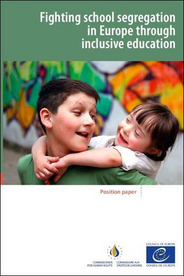Despite the legislative aim of achieving educational equality, as exists in many European states, some categories of children are excluded from quality education due to the highly selective practices of some education institutions.
Children with disabilities, as well as Roma and migrant children are the most affected by this policy of segregation. Surveys show that a disproportionate number of them are enrolled in remedial classes and receive less demanding and often substandard education.
However, social heterogeneity in the classroom, mixing diverse ethnic and cultural backgrounds, has a positive impact for the most vulnerable pupils, who benefit from the more advantaged peers.
Moreover, inclusive education, integrating economic, cultural, and religious differences, is also beneficial for the public interest because it prepares children for living and working in today’s multicultural societies. It therefore has a huge potential for improving social cohesion.
“Fighting school segregation in Europe through inclusive education” is an overview of the current situation in the Council of Europe’s states and sets forth key principles to secure genuinely fair and equal schooling, which will achieve success both for individual students and for society as a whole.
The report is also available in French here.
Source: Directorate of Communications, Council of Europe

